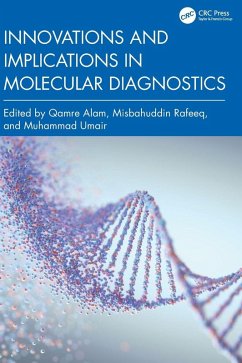Innovations and Implications in Molecular Diagnostics
Herausgeber: Alam, Qamre; Umair, Muhammad; Rafeeq, Misbahuddin
Innovations and Implications in Molecular Diagnostics
Herausgeber: Alam, Qamre; Umair, Muhammad; Rafeeq, Misbahuddin
- Gebundenes Buch
- Merkliste
- Auf die Merkliste
- Bewerten Bewerten
- Teilen
- Produkt teilen
- Produkterinnerung
- Produkterinnerung
This book covers advancements in molecular diagnostics, emphasizing foundational DNA analysis techniques, advanced PCR methods, next-generation sequencing, and the role of bioinformatics, nanotechnology, and AI in diagnostics. This book is intended for professionals and researchers in molecular diagnostics, biotechnology, and genomics.
Andere Kunden interessierten sich auch für
![Latest Research on Breast Cancer - Molecular Insights, Diagnostic Advances and Therapeutic Innovations Latest Research on Breast Cancer - Molecular Insights, Diagnostic Advances and Therapeutic Innovations]() Latest Research on Breast Cancer - Molecular Insights, Diagnostic Advances and Therapeutic Innovations160,00 €
Latest Research on Breast Cancer - Molecular Insights, Diagnostic Advances and Therapeutic Innovations160,00 €![M-Health Innovations for Patient-Centered Care M-Health Innovations for Patient-Centered Care]() M-Health Innovations for Patient-Centered Care216,99 €
M-Health Innovations for Patient-Centered Care216,99 €![Information Systems Innovations for Nursing Information Systems Innovations for Nursing]() Sue MoorheadInformation Systems Innovations for Nursing94,99 €
Sue MoorheadInformation Systems Innovations for Nursing94,99 €![Home Healthcare Services and Technology Implications Home Healthcare Services and Technology Implications]() Home Healthcare Services and Technology Implications198,99 €
Home Healthcare Services and Technology Implications198,99 €![THE YOUTH, DRUG ABUSE AND ADDICTION; COUNSELLING IMPLICATIONS THE YOUTH, DRUG ABUSE AND ADDICTION; COUNSELLING IMPLICATIONS]() Innime RighteousTHE YOUTH, DRUG ABUSE AND ADDICTION; COUNSELLING IMPLICATIONS27,99 €
Innime RighteousTHE YOUTH, DRUG ABUSE AND ADDICTION; COUNSELLING IMPLICATIONS27,99 €![Innovations in Paediatric Ambulatory Care Innovations in Paediatric Ambulatory Care]() Edward Alan GlasperInnovations in Paediatric Ambulatory Care57,99 €
Edward Alan GlasperInnovations in Paediatric Ambulatory Care57,99 €![Policies, Initiatives, and Innovations for Global Health Policies, Initiatives, and Innovations for Global Health]() Policies, Initiatives, and Innovations for Global Health284,99 €
Policies, Initiatives, and Innovations for Global Health284,99 €-
-
-
This book covers advancements in molecular diagnostics, emphasizing foundational DNA analysis techniques, advanced PCR methods, next-generation sequencing, and the role of bioinformatics, nanotechnology, and AI in diagnostics. This book is intended for professionals and researchers in molecular diagnostics, biotechnology, and genomics.
Produktdetails
- Produktdetails
- Verlag: CRC Press
- Seitenzahl: 204
- Erscheinungstermin: 10. September 2025
- Englisch
- Abmessung: 260mm x 183mm x 16mm
- Gewicht: 589g
- ISBN-13: 9781032787251
- ISBN-10: 1032787252
- Artikelnr.: 73776204
- Herstellerkennzeichnung
- Libri GmbH
- Europaallee 1
- 36244 Bad Hersfeld
- gpsr@libri.de
- Verlag: CRC Press
- Seitenzahl: 204
- Erscheinungstermin: 10. September 2025
- Englisch
- Abmessung: 260mm x 183mm x 16mm
- Gewicht: 589g
- ISBN-13: 9781032787251
- ISBN-10: 1032787252
- Artikelnr.: 73776204
- Herstellerkennzeichnung
- Libri GmbH
- Europaallee 1
- 36244 Bad Hersfeld
- gpsr@libri.de
Dr. Qamre Alam currently serves as a Medical Research Scientist and Laboratory Supervisor at the Molecular Genomics and Precision Medicine Department of ExpressMed Diagnostics and Research, located in Zinj, Kingdom of Bahrain. Previously, from 2019 to 2022, he held the position of Medical Research Scientist at the Medical Genomics Research Department at King Abdullah International Medical Research Center (KAIMRC), part of King Saud bin Abdulaziz University for Health Science, Ministry of National Guard-Health Affairs (MNGHA), Riyadh, KSA. Prior to that, he worked as a lecturer from 2011 to 2019 at the King Fahd Medical Research Center, King Abdulaziz University, Jeddah, KSA. Dr. Qamre Alam earned his M.Sc. from Jamia Hamdard University, New Delhi, India, and his Ph.D. in Biotechnology from JJTU, Rajasthan, India. He has an impressive publication record, with over 75 research articles in the fields of human genetics and cancer biology. Dr. Alam is a molecular geneticist with a strong research interest in rare genetic disorders. He has actively contributed to various projects related to rare genetic disorders and preventive genomic medicine, including Non-Invasive Prenatal Testing (NIPT) and Preimplantation Genetic Screening (PGS). Additionally, he serves as an Associate Editor and reviewer for several international peer-reviewed journals of high repute. Dr. Misbahuddin Rafeeq is a distinguished physician, accomplished scientist, and dedicated medical educator. He earned his MBBS and MD degrees in 2009 from Aligarh Muslim University, India. Currently, he holds the position of Associate Professor at the Faculty of Medicine (Rabigh) within King Abdulaziz University, Jeddah, Saudi Arabia. Dr. Rafeeq is an esteemed member of the editorial boards of several reputable journals. His wealth of expertise has been showcased through his active participation in numerous scientific events spanning across regions such as India, Southeast Asia, Asia-Pacific, Europe, the UK, the Middle East, Africa, the Balkans, and the US. His outstanding contributions have earned him several prestigious awards, including the Excellent Leadership Award from the Islamic Development Bank in Saudi Arabia, the ESP fellowship from NIHES in the Netherlands, the Distinguished Achievement Award from KAU in Saudi Arabia, and the Bronze Prize from the Diabetic Congress in the USA. Dr. Rafeeq is affiliated with esteemed organizations and scientific societies, including RCPEdin and the Faculty of Pharmaceutical Medicine at RCP London, ACCP and ASPET in the USA, ISoP, and the Royal Society of Medicine in the UK. Additionally, he serves as an honorary consultant on various educational boards and holds the position of International Secretary for SoPI in India. Dr. Rafeeq boasts an impressive publication record with over sixty high-impact and indexed publications to his credit. Furthermore, he has secured funding for several large grants, where he has served as both a Principal and Co-Investigator. His research primarily focuses on the identification of novel genetic mutations in hereditary syndromes, the exploration of novel therapeutic targets and proteins through molecular docking, PK/PD, and toxicity studies, the study of the effects of natural compounds on animal models, and the broader field of lipid pharmacogenomics. Dr. Muhammad Umair currently holds the position of Research Scientist and serves as the Team Leader of Functional Studies at the Medical Genomics Research Department within the King Abdullah International Medical Research Center (KAIMRC), part of King Saud bin Abdulaziz University for Health Science, Ministry of National Guard-Health Affairs (MNGHA) in Riyadh, Saudi Arabia. Additionally, he serves as a "Research Advisor" at the Department of Life Sciences within the School of Science at the University of Management and Technology (UMT) in Lahore, Pakistan. Dr. Umair is a molecular geneticist with a particular focus on rare genetic disorders (RGDs). His research involves multiple projects dedicated to rare genetic disorders and therapeutic genetics. He is currently engaged in research initiatives such as the Genetics and Rare Disease Program, Genetic and Functional Characterization of Rare Skeletal Disorders (GSDs), Genodermatosis, Preventative Genome Medicine for Inherited Genetic Disorders, Functional Characterization of Genes Associated with Neurodevelopmental Disorders (NDDs), Genetic and Rare Disease Registry, and Therapeutic Genomics. Dr. Umair earned his M.Sc., M.Phil, and Ph.D. in Biochemistry/Molecular Biology, specializing in Human Molecular Genetics, from Quaid-i-Azam University in Islamabad, Pakistan. His extensive contributions to the field are reflected in his publication record, which comprises over 190 research articles in the domain of human genetics. He also actively participates as an Associate Editor and reviewer for several international peer-reviewed journals. In recognition of his outstanding achievements in genetics, Dr. Umair was honored with the 2nd Dr. Sajjad Aslam Shami Gold Medal in Genetics by the Applied Zoological Society of Pakistan (AZSP) in March 2021.
Chapter 1. Evolution of Molecular Diagnostics: From Genetic Foundations to
Modern Technological Innovations. Chapter 2. Sample Handling in Molecular
Diagnostics. Chapter 3. Polymerase Chain Reaction and Its Variants in
Molecular Diagnostics. Chapter 4. CRISPR-Based Diagnostic Technologies.
Chapter 5. Next-Generation Sequencing (NGS). Chapter 6.
Nanotechnology-Based Diagnostics. Chapter 7. Role of AI in Molecular
Diagnostics. Chapter 8. Molecular Diagnostics in Cardiovascular Diseases.
Chapter 9. Advancements in Cytogenetics for Molecular Diagnostics. Chapter
10. Microfluidics and Lab-on-a-Chip Technologies. Chapter 11.
Transcriptomics Analysis in Molecular Diagnostics.
Modern Technological Innovations. Chapter 2. Sample Handling in Molecular
Diagnostics. Chapter 3. Polymerase Chain Reaction and Its Variants in
Molecular Diagnostics. Chapter 4. CRISPR-Based Diagnostic Technologies.
Chapter 5. Next-Generation Sequencing (NGS). Chapter 6.
Nanotechnology-Based Diagnostics. Chapter 7. Role of AI in Molecular
Diagnostics. Chapter 8. Molecular Diagnostics in Cardiovascular Diseases.
Chapter 9. Advancements in Cytogenetics for Molecular Diagnostics. Chapter
10. Microfluidics and Lab-on-a-Chip Technologies. Chapter 11.
Transcriptomics Analysis in Molecular Diagnostics.
Chapter 1. Evolution of Molecular Diagnostics: From Genetic Foundations to
Modern Technological Innovations. Chapter 2. Sample Handling in Molecular
Diagnostics. Chapter 3. Polymerase Chain Reaction and Its Variants in
Molecular Diagnostics. Chapter 4. CRISPR-Based Diagnostic Technologies.
Chapter 5. Next-Generation Sequencing (NGS). Chapter 6.
Nanotechnology-Based Diagnostics. Chapter 7. Role of AI in Molecular
Diagnostics. Chapter 8. Molecular Diagnostics in Cardiovascular Diseases.
Chapter 9. Advancements in Cytogenetics for Molecular Diagnostics. Chapter
10. Microfluidics and Lab-on-a-Chip Technologies. Chapter 11.
Transcriptomics Analysis in Molecular Diagnostics.
Modern Technological Innovations. Chapter 2. Sample Handling in Molecular
Diagnostics. Chapter 3. Polymerase Chain Reaction and Its Variants in
Molecular Diagnostics. Chapter 4. CRISPR-Based Diagnostic Technologies.
Chapter 5. Next-Generation Sequencing (NGS). Chapter 6.
Nanotechnology-Based Diagnostics. Chapter 7. Role of AI in Molecular
Diagnostics. Chapter 8. Molecular Diagnostics in Cardiovascular Diseases.
Chapter 9. Advancements in Cytogenetics for Molecular Diagnostics. Chapter
10. Microfluidics and Lab-on-a-Chip Technologies. Chapter 11.
Transcriptomics Analysis in Molecular Diagnostics.








